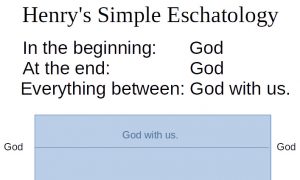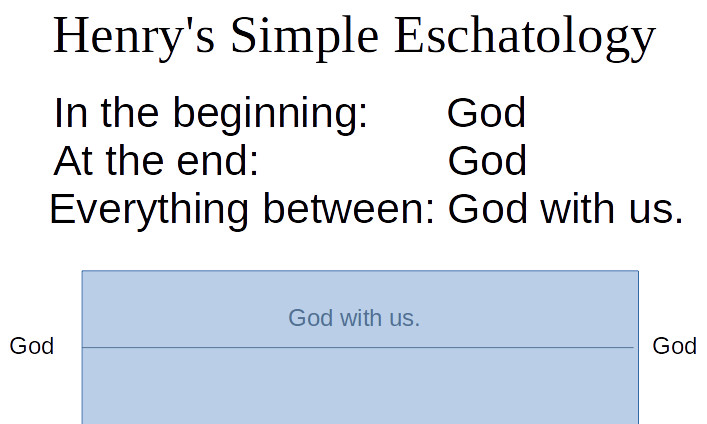Eschatology: What Is Prophecy
Tonight I’ll be continuing my study on Eschatology, using my Google+ page and YouTube channel. I’ll embed a YouTube viewer below.
In preparation for this study I think it would be useful to read my post from earlier this morning titled Link and Notes on Textual Criticism. That may sound irrelevant, but in it I try to say something about why I study details even though I don’t think we can attain certainty that we have the details right.
In talking about eschatology I’ve found that there’s great complexity in explaining all of the various views of the end times. For many, eschatology (if they know the word) is supposed to be about outlining how future history will go and how we will know that Jesus will appear. I’m not going to sneak anything up on you. I reject that viewpoint. Neither prophecy nor any other form of predictive statement, including the extended visions of apocalyptic, provides or is intended to provide an outline of the end of the world. What it is intended to accomplish is to let you understand how to live through the difficult times and come through to the end. The end of the particular trouble—and much of this material comes at a particular time of trouble—may not end with the end of the world. Much of apocalyptic literature reads that way, assuring suffering people that God will win in the end, but the times of trouble pass, and “the end is not yet.”
Here’s my simple eschatology (click to expand):
 You may find that particularly unsatisfactory. If so, you will perhaps want to listen to the way someone else interprets prophecy and eschatological language. But I think you are likely to be disappointed. The field of prophecy, whether we’re talking about ancient Israel or modern prophets in the church, is filled with cute explanations for why various interpretations of predictions haven’t worked out. I think there’s a reason for this.
You may find that particularly unsatisfactory. If so, you will perhaps want to listen to the way someone else interprets prophecy and eschatological language. But I think you are likely to be disappointed. The field of prophecy, whether we’re talking about ancient Israel or modern prophets in the church, is filled with cute explanations for why various interpretations of predictions haven’t worked out. I think there’s a reason for this.
Two options for that reason: 1) God didn’t want us to know or 2) We’re too stupid to figure out what God was saying. We’ve simply been wrong too many times.
I could say that the literature itself has failed either because we couldn’t get what God had in mind into print or because God has failed. Always assuming, of course, that I’m not willing to go with the traditional approach which is to forget about each failed prophetic interpretation and go on making more and more unsubstantiated predictions. Instead, I’ve looked back at these texts and I don’t think we’re supposed to get that sort of detail out of them. What we’re supposed to be doing is looking at how God has worked with people, the manner in which God is with us in the interim. I think we can learn a great deal.
So reading Revelation is not just a matter of looking for the literal meanings of various symbols. It is, instead a process of understanding how this text spoke to people in trouble and how it can speak to others who are similarly in trouble. I will be developing that point of view in this series.
The critical think to note from last week’s presentation is learning to make a break from the puzzle pieces approach. Much of the writing and preaching on Daniel and Revelation, or on eschatology in general is based on this approach. If I can find the right place in the text in Daniel 7, connect it with the right place in Daniel 8 and then 9, connect all of those to Isaiah 65 & 66 at just the right points, pull in a verse from 1 Thessalonians, then tie all of that to selected anchor points in Daniel 12 & 13, I ‘ll know what’s coming next. I can make a chart. I can be safe.
I would suggest that such charts are about as safe as the Tower of Babel. They come from our desire to eliminate uncertainty from our lives. We want to make our lives safe, to know what we will face, and most especially to be able to point to specific things we will avoid, while others suffer. In my view the pre-tribulation rapture partakes of wish fulfilment. We’ve read about times of trouble, and we want to find a way to say that we won’t be here for the greatest time of trouble. So we have found out when it will occur and we have found out that we can avoid it. Well, we think we can.
You know what I think? If the pre-tribulation rapture is true, as a follower of Jesus I should want to be here after the rapture to help take the gospel to those left behind. Yes, I know, there are various explanations of why this wouldn’t be the case. I just don’t believe them.
I will certainly be looking in this series at the wide variety of interpretations. How do we paste scriptures together to make doctrines such as the rapture? But I will be more interested in looking at the question of how we will live in the “God with us” period that stands between God’s creation in the beginning and God’s renewal at the end.
One might try to discard apocalyptic because of what it looks forward to. If the period of trouble will (or may) end without the end of the world, so clearly expected by the writer of apocalyptic, of what good can the material be? Well, in each case the time of trouble did end, and there was something in that message that helped through the time. We’re going to look for that.
Read Daniel 2 and 7. Now consider this: Is the key message in Daniel 3:18 or Daniel 7:13? (Leaving open the possibility that the answer is neither!) Which one do we quote or consult more?
Tonight I’ll be talking about the purpose of prophecy. I don’t believe biblical prophecy is intended for the same purpose as consulting psychics. (Note: I’m not maintaining that psychics can provide accurate information about the future. In fact, I believe they truly cannot. But people consult them in that hope.) Biblical prophecy is intended to help us live in God’s world with the knowledge that whatever happens God is with us.
Here’s the viewer for tonight:

